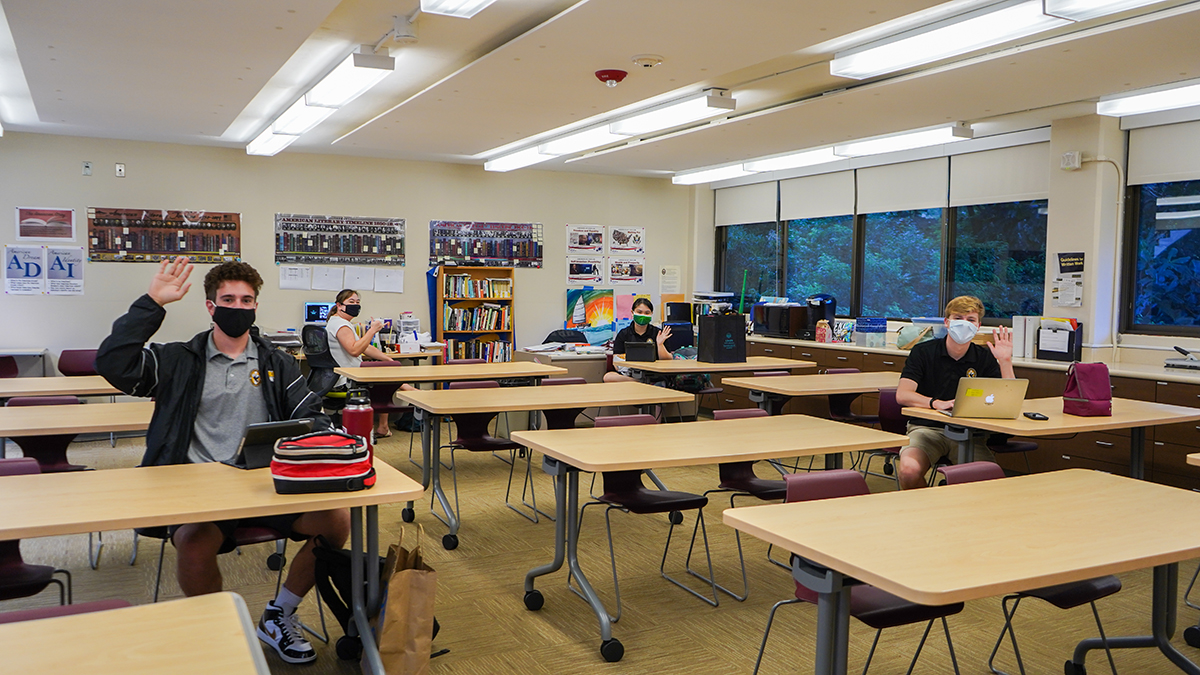School Plans Take Shape with Vaccinations and Contact Tracing


When the first COVID-19 vaccines were approved by the FDA, the most common questions that arose concerned distribution plans and vaccine safety. Currently, Hawaii is prioritizing vaccinating kupuna — people 75 and older — in Hawaii and teachers are next in line. According to HBA President Ron Shiira, the school “will not require students or faculty/staff to be vaccinated for COVID-19 to continue enrollment or employment. This follows both the national and state guidelines.”
As in most states, first responders and healthcare workers in Hawaii were the first in line to get the vaccine. Jenny Lee, parent of HBA sophomore Megan Lee, is a pharmacist at a local drug store and she was among the first group of people in Hawaii who received the vaccine. Recounting her experience, Lee said, “I was worried about the side effects – that it might cause weakness, fever. After I got it, I just had a little hot flash, and a fever, and a sore arm.” Another HBA parent, Korey Chock, father of this reporter, was part of the City and County of Honolulu team that coordinated the vaccination of healthcare workers and first responders. He also was among the first group of people in Hawaii who received the vaccine. “The shot was really painless and I didnʻt have any side effects other than pain at the injection site,” he said. “I was somewhat relieved getting the first shot, however the work to vaccinate more frontline workers and the general public has been continuing every day.”
Since the vaccine has not been approved for people 16 and younger, sophomore Kyle Kumasaka, who is 15, has mixed feelings about it. “When the vaccine is available to our age group, I still don’t know if I will get the shot. I feel like it’s still too early and more research needs to be done to fully understand this new vaccine,” he said. Senior Logan Kaneshiro, age 17, felt less worried about the vaccine’s safety. “Many people think that the vaccine is going to be unreliable because of how quickly it was produced. But I don’t think they’d give it to all the health care workers if they weren’t certain of its effectiveness and dependability. Regarding the effects of it, I am pretty worried because I heard that many people had a bad reaction to it. However, I also know people who have not,” he said.
Looking ahead to when the vaccine becomes available to students, HBA President Shiira indicated that he is open to hosting vaccination clinics at HBA. “If we are able to host a vaccine clinic for our students, we will certainly do so. We are already speaking with our vendors who have helped us with our flu clinics in the past, and we are all hopeful that we can provide something for our students once the vaccines become available for children,” he said.
This month, HBA is implementing a contact tracing system where students, faculty and staff wear small proximity tracking devices while at school. In a newsletter that was emailed to parents in mid-January, Shiira announced that the school would be issuing contact tracing devices—Kogniz discs—to staff, faculty and students on all HBA campuses. In the newsletter, Shiira stated, “The purpose of these discs is to help us improve our contact tracing should a student and/or faculty/staff member test positive for COVID-19.” The Eagle Eye reached out to Shiira for clarification on how the discs work and asked him to address concerns about privacy. “The discs are tracked via Bluetooth technology, which could allow us to track students off-campus. However, we are committed to the privacy of our families, so we will only track the discs on our campuses. Only the president’s office and principals will have access to the information collected by the discs,” he explained. Shiira also emphasized that “only the president’s office and principals will have access to the information collected by the discs” and that “only identification numbers for the discs may be viewed on the contact tracing portal.”
As to plans for the fourth quarter and next school year, Shiira said, “We are very excited that the COVID-19 vaccine is being administered across our islands. Should the state’s rollout go as planned, we are very hopeful that we will be able to fully return to campus in the fall. However, we will only do so if it is safe.”
